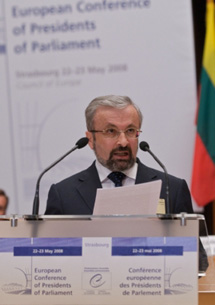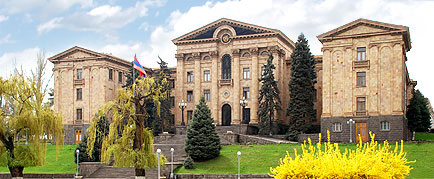On May 22 in Strasbourg the President of the National Assembly of the Republic of Armenia Mr Tigran Torosyan met with the Marshal of the Polish Senate Mr Bogdan Borusewicz. Noting after the last meeting there had been several elections in Armenia and in Poland, the NA Speaker expressed conviction that good opportunities and prospects for active and comprehensive development of relations had been created.
Congratulating once again the NA President for the successful elections the Marshal of the Polish Senate Mr Bogdan Borusewicz reaffirmed the invitation of the official visit to Warsaw, noting that the interest towards Caucasus increased not only in Poland, but also in the European Union. Touching upon the March events Mr Borusewicz stressed that now the situation is stable in Armenia, and expressed hope that the restrictions of assemblies, rallies and demonstrations would be lifted, and the detained persons, who did not commit crime, would be released. The Marshal of the Polish Senate also reaffirmed the position of Poland on Nagorno Karabakh problem – the support to the work of the OSCE Minsk group. It was also noted that the European Union also stresses very much the solution of the problem.
At the colleague’s request touching upon the March events the NA President Mr Tigran Torosyan noted that the presidential elections and March 1-2 events should be clearly separated. He presented the details of those events, the further developments and the steps taken towards the settlement of the situation. It was also noted that in the National Assembly a group studying the reasons of the March events was created, as a result of which many questions would get their answers.
During the meeting the sides also touched upon the problem of the arrested: the NA President ensured that those who committed serious crimes, those whose actions caused death of ten people and hundred of wounded people, would be punished, and nobody could be punished merely for his/her political views. Mr Borusewicz expressed hope that at the meeting in Warsaw only the issues of deepening cooperation would be discussed.
During the meeting other issues were also discussed, which were of bilateral interest.
On the same day the NA President Mr Tigran Torosyan met with the new head of Ago Group Mr Stelian Stoian. He has been twice with Ago Group in Yerevan, and in his words, at the basis of this meeting there was wish of continuing the dialogue started in Yerevan in March. Mr Stoian ensured that though the president of the Ago Group was changed, but in essence, the cooperation had not been changed, and the partnership would effectively continue.
The NA President Mr Tigran Torosyan congratulated Mr Stoian on the occasion of being elected to the head of the Ago Group and expressed confidence for active cooperation too. The NA Speaker noted that from 2001 the Council of Europe had greatly supported Armenia with respect to the development of democracy, and that support was continuing. At the request of the head of the Ago Group the NA President told about the work done in the direction of the fulfillment of the Resolution 1609. He noted about the agreement of creating an ad hoc committee of the National Assembly for clarification of the March events, where representatives of extra-parliamentary political forces and public organizations, as well as experts of international organizations would be involved in the work. The active work on the draft law on Conducting Meetings, Assemblies, Rallies and Demonstrations with the experts of the Venice Commission and OSCE/ODIHR was highlighted. It was noted also that a working group was set up in the National Assembly for the improvement of electoral process again with the involvement of extra-parliamentary forces. The NA Speaker also touched upon the clause of Resolution 1609, which referred to the law on Radio and Television, noting that in reality it referred not to the formation of the National Committee on Radio and Television, which was set out in accordance with the constitutional amendment, which enjoyed the endorsement of the Venice Commission, but the election of the candidates of the membership of the committee. Touching upon the PACE Resolution 1609 adopted in January the NA Speaker informed the head of the Ago Group that for the increase of the opposition’s powers the proposed 22 powers from 27 are already set out, a draft law on several powers is being prepared.
During the meeting the issue of the persons arrested because of March events was also discussed. At Mr Stoian’s request the NA President presented the position of the authorities of the Republic of Armenia and noted that at the consultation held by the President of the Republic on May 19 over that issue it was clearly recorded that the people, who committed grievous criminal crimes, should be unreservedly punished, nobody would be pursued for his/her political views.
The newly elected head of Ago Group expressed great satisfaction over the thorough and extended information provided by the NA President. He especially highlighted that the working group created for the use of the Resolution 1609 heads the NA President, which testified the serious and concerned attitude of the Armenian authorities to the fulfillment of PACE Resolution. Mr Stoian considered important also the fact that in the National Assembly would be set up an ad hoc committee, involving the parliamentary and extra-parliamentary political forces and representatives of civil society. As he assessed, defining the committee’s powers was very important, not only with respect to the consequences of the events of March, but also the disclosure of the reasons, which would promote the formation of an atmosphere of trust in society.
Mr Stoian was also interested in the adoption of the law on Yerevan, which was one of the obligations undertaken by Armenia while joining the Council of Europe. He thanked the NA President for the voluminous work done and expressed confidence that in June, when in PACE they would refer to the situation in Armenia, there would be occasions for positive assessments.
On May 23 at the
European Conference of Presidents of Parliaments in Strasbourg during the debate of  the issue “Added value of the Council of Europe as guardian of the core values” the P
resident of the National Assembly of the Republic of Armenia Mr Tigran Torosyan gave a speech:
the issue “Added value of the Council of Europe as guardian of the core values” the P
resident of the National Assembly of the Republic of Armenia Mr Tigran Torosyan gave a speech:
“First of all, Mr President, I would like to congratulate you on the occasion of the success of this important conference. That is conditioned, first of all, by the election of the themes of the debates. Both of them, certainly, are very important. But I would like to separate especially the second one, which makes us reassess once again the link Council of Europe – European values. I would like to continue my speech in my mother tongue, aiming to make it sound in this hall especially during this debate. I think, that will underline once again the unity and diversity of identity of our values dear for all of us, as the Armenian language is one of the oldest languages of the Indo-European family.
During the history of the mankind Europe is a unique phenomenon. It is the only one that has shaped voluntary formations uniting several dozens of countries on the basis of clearly set out fundamental values – democracy, human rights and rule of law. The Council of Europe is the first viable structure of that formation, but when it became clear that at the base of the European Union firmer economic ties, some of them began to highlight less the Council of Europe. Sometimes even opinions were sounded that the Council of Europe had exhausted itself, and had nothing to do. They seemed to forget that after the World War II, when it seemed to be close to the sunset of the exhausted and destructed Europe, when it seemed that the new war between France and Germany was inevitable, with the efforts of those countries on the basis of European values with the formation of European structures the Renaissance of Europe had begun. Sometimes, when the fundamental values become the inseparable part of everyday life, their unique importance begins to be forgotten.
How surprising it is, but the collapse of the Soviet Union became the stimulus of reassessment. The post-Soviet transformation gave new breath and importance to the Council of Europe. It started a new phase of European integration. The countries, which regained independence, appeared in a unique historical situation. The state and economic systems collapsed at once, the experience and knowledge of the formation of new systems, the conflicts made complicated the solution of the complex problems.
The Council of Europe proposed a system of values to our countries, which is equally useful for the settlement of conflicts, organization of social-political life, strengthening of statehood and the solution of the hard problems connected with it. Moreover, it proposed a wide professional support of the experienced structures. I can say with the example of my country that such support in the formation of the legislation regulating the elaboration or improvement of the Constitution, and social-political life is difficult to overestimate. I would like to express my gratitude to the Council of Europe, the Venice Commission for the eight-year effective cooperation and support.
Of course, the Council of Europe too, as any organization, needs to continuously develop and improve and upgrade the mechanisms for overcoming the present and future challenges. Today those challenges are extremely serious: preference of the political temporary interests over fundamental values, perversion of values and mechanisms, use of double standards, etc. However, that emphasizes more the unique importance that the Council of Europe had and will continue to have in the life of Europe. It has been and remains the main guardian of the fundamental European values, consequently, the guarantor of the development of a united Europe and further integration.”
On May 23 the President of the National Assembly of the Republic of Armenia Mr Tigran Torosyan in Strasbourg met with the PACE President Mr Lluis Maria de Puig.
The NA President presented Mr Puig the steps being undertaken in the direction of the fulfillment of the requirements of the PACE Resolution 1609 and confirmed once again his invitation to Armenia. Mr Torosyan highly assessed the results of the conference of Presidents of Parliaments, which created a basis for the development of the ideas in future.
The PACE President Mr Lluis Maria de Puig expressed satisfaction for the steps undertaken in the direction of the fulfillment of the Resolution 1609 during the short period, noting that the PACE supported and would continue to support Armenia. Mr Puig highlighted the fulfillment of the reforms of the second generation in Armenia. As he said, in June the co-rapporteurs of the Monitoring Committee would visit Armenia in order to present the whole picture of the development of the events after March 1-2 and the summary of the procedure of the fulfillment of the Resolution 1609. The PACE President confirmed again his willingness to visit Armenia.




